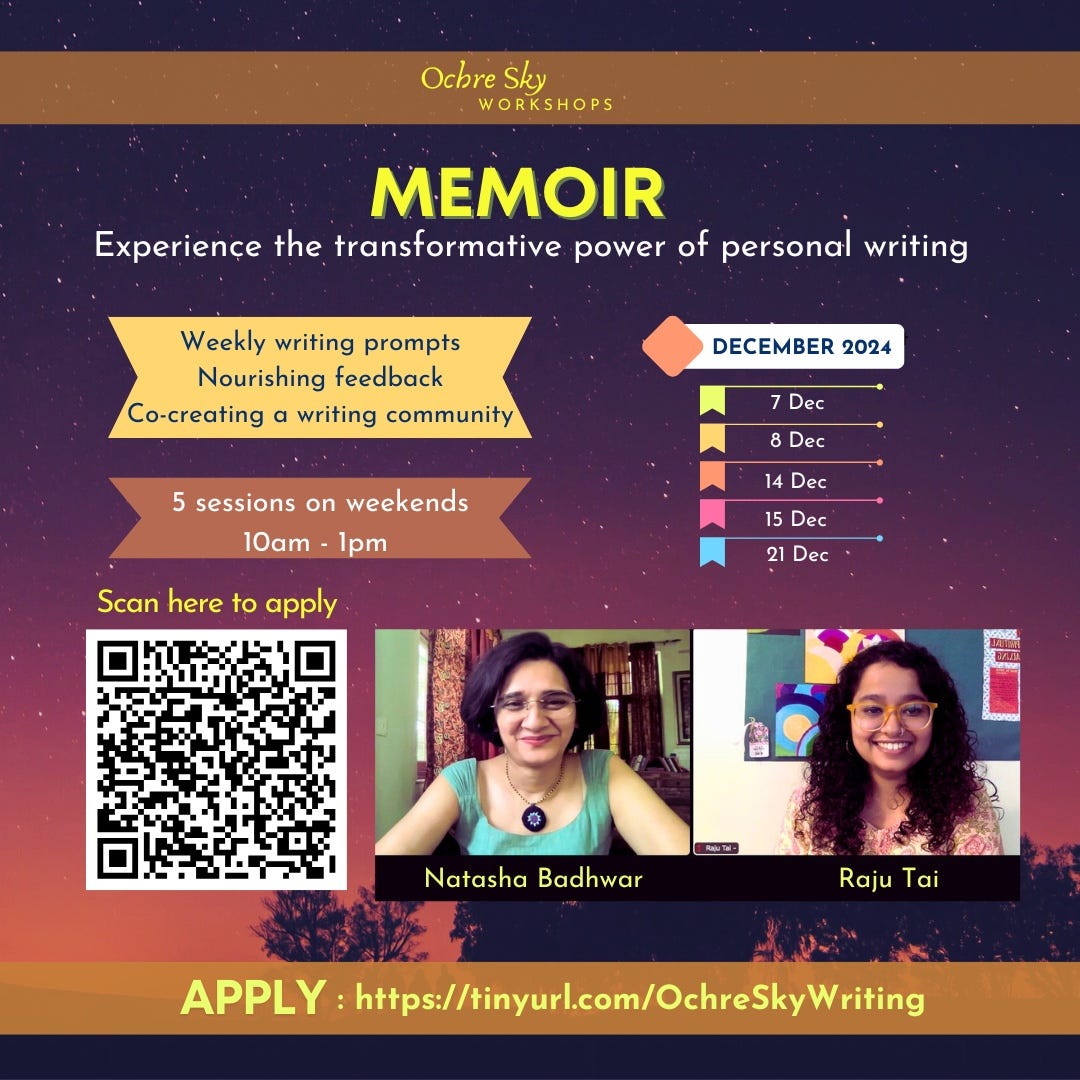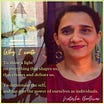Stories that demand to be told | #25
"We must summon the resources to console, reassure and to move towards respair. We need to protect our loves so that love can protect us."
This is the 25th edition of Stories that demand to be told, a curated spread of the most evocative, resonant, real stories. Welcome to Ochre Sky Stories, a home for writers from the Ochre Sky Workshops, facilitated by
and .1. Blood & Breath by
Because we think women who are abused look different, no?
I knew all the words I read feminist literature I was college-educated had a management title at work
I didn't have the makings of a helpless woman battered I was a strong independent wise intelligent woman Who was just in love with a very troubled man And I was the only one who understood him He told me so And I believed it so
2. Invitation to a Scruffy Way of Life by Shelja Sen
The interesting thing is that most of us prefer to show shiny versions of ourselves to others and yet feel very honoured when others show their scruffy parts. It's like dropping into our friend's home uninvited and they welcome us warmly with no attempt to hide the laundry basket lying in the corner or scrambling to change out of their pyjamas. And being invited over for a rustled-up meal which you relish over deep conversations, laughter and togetherness. If you have enjoyed that experience you would know the joy of being included and feeling at home. Why is it that we find it difficult to give others what we seek from them.
In that context, the scruffy home is a powerful metaphor for life. The shift for me has come in waves. It began when my kids (and dog) were little and their clutter was huge. As they grew up, they seemed to be oblivious to the chaos that surrounded them. "Don't you think you should clean your room before your friends visit," I would appeal and their inevitable response was, "We don't care and they don't care. My husband did not care much, too, unless it came to his kitchen and cooking But that is his story to tell. Then came the pandemic and a realisation that this "stuff" really does not matter in the big picture of life. We adopted the Japanese "wabi-sabi and be- came comfortable in our unvarnished, imperfect homes. Then finally came our cats! They made our sofas into scratching posts, and curtains into swinging ropes and their litter trays took over the pretty corners of our home. We learned to shrug our shoulders, smile and go with the scruffy flow.
3. Friends who kiss by
The first time we kissed was on a night like this. We'd always been physically affectionate, it came with the territory. Young people spending many hours together everyday tend to form these sorts of friend groups, where everyone has kissed everyone. Or was it just me? We’d go out drinking and then to someone’s house to continue. I’d be in my own bed as the sun comes up with plans to do it all again tomorrow.
We were out drinking one night with our friends and found ourselves in the smoking area with a smaller group. It’s more intimate, this gang is close, this is where we debrief the party. I was sitting up on a half wall, my legs dangling. They’re standing next to me and we’re sharing a cigarette. We were holding hands, and as our friends got caught up in conversation, they stepped forward to stand in between my knees. Something shifted. I looked up and met their eyes. This intensity was unfamiliar, not unwelcome. I resisted the pull, my body wanted to lean in closer, reach out and touch their cheek. They leaned in a fraction. My heart thumped in my ears. The music and chatter faded out. Someone laughed loudly, piercing the sudden intimacy. Later. Without an audience.
4. Falling in and out by
Dear anxiety, you are a hard friend.
I say I don't know, but I do have a clue about being anxious today. Even if I don't know the contours of every leaf on this sapling, I know a little about the kernel. I wonder why my anxiety came to me as a plant today. I've only thought of it as a coiled spring before, or an angry person living inside my neck.
Today I can pinpoint a little, and yet so often it’s the sum of many little things hard to clearly specify. Persistent bits and pieces, more anticipatory than real. And yet, so visceral. Real existing bodies inside my body.
And this has been the turn of the years. Hardly a week without the medley of these feelings. Finding ways to live with and despite it. Writing about it helps me give it some of my own words and phrases, but the practice of being kind to myself and to my anxiety, and finding ways to keep going, remains a lifelong practice.
5. The poetry of space by
There was a small meeting room with a view of the gulmohar trees that always seemed to be in bloom. I loved that room. It became my refuge, where I could think clearly about what mattered most. I remember sitting there, looking out at the Gulmohar tree-lined street below, as I wrestled with another big decision: to leave the company I had co-founded and step into an entirely different future. The view outside steadied me and grounded me in nature’s rhythms, giving me a sense of strength to take the call my heart was telling me to take.
What power do these spaces hold over us? Do they provide a sanctuary from the world outside, allowing us to process contradictory thoughts in familiarity? Or is it simply that they will enable us to make leaps of faith that the world asks of us?
..Can physical spaces be where we keep our earliest emotional and psychological furniture? Over the years, I’ve understood that transformation isn’t always an outward display; sometimes, it’s a slow burn that unfolds quietly in spaces where we feel most shielded, even from ourselves. I think about the places that have shaped me. Those walls reflected my ambitions, doubts, and questions. It was here that my identity was getting shaped.
6. Techbro Saves the World by
Back then, his parents barely had enough money to send him to engineering prep school in Kota. And then to pay for IIT. And then for Harvard Business School. It was a tough time, but that gave him faith in capitalism. He had worked very hard. He had to take on teaching assistant positions for his weekly beer money. He couldn’t even afford a cleaning lady at $75 an hour. Had to do his own dishes and wash his own clothes. But he had persevered. If you wanted it badly enough, everything was achievable. Rewards were for the taking. All you needed was the grit to work really hard.
He had taken a class on Philanthrophy 10 years ago. He still remembered the fat girl with the piercing green eyes in that class who looked like she would put him through the wall every time he spoke. One time, all he’d said was that politics had nothing to do with the private sector. Obviously, the endowment had a fiduciary duty to make money. He didn’t see why one would divest from fossil fuel or prisons. The mandate was clear. Make money. She had stared him down for the rest of the class. And then waited for it to end to corner him. “It’s because of assholes like you, that the world is a shit show. Every decision you make is a political one. It’s your entitlement that blinds you from seeing it”.
What did she know about entitlement in India? He wasn’t even a Brahmin; he was a Kshatriya. His parents had to work really hard. It helped that they had ancestral land up and down North India and that his grandfather was a zamindaar.
7. How to make love stay in the age of anxiety by
The more we accept our separateness, the more we create opportunities to come together again. Father Os is not here anymore, but I hear his voice guiding me when I slow down and allow myself to pay attention.
Collectively, we are emerging from the trauma and loss caused by a mismanaged global pandemic. The crumbling of democracies and loss of individual freedoms all over the world is wrecking our sense of belonging. Our relationships and personal well-being isn’t going to be immune to this brutal, slow-motion devastation.
We will need more space to act out our anxieties. Language may not always be adequate to offer succour. We must summon the resources to console, reassure and to move towards respair. We need to protect our loves so that love can protect us.
8. Why we secretly avoid, resent, and disown poetry by
We are born into poetry. Our life starts with songs and lullabies in our mother tongue, words are made rounder for our little ears, we love the repetition of sounds, our senses grasp at everything anew. For the first three years, the world is a poetic place. We love rhymes and tongue twisters. Our brain loves predicting the next line, and our heart loves the thumping rhythms. We enjoy small poems, maybe in two languages, and commit them to memory without even trying.
Somewhere in middle school, the poems lose their joy. It’s not enough to enjoy the rhythm, we have to find the rhyming scheme. The poets, dead white dudes, seem to have encoded a singular meaning into the poem, which according to our English teacher, needs to be decoded and noted down. We scratch our heads or plagiarise the summary from a digest. We are asked to convert 2-line dohas of Kabir, or 14-line sonnets of Wordsworth into 3 pages of prose.
We are taught, not to love poetry, but to destroy its weave. Stale poetry writing assignments are handed to us once a year. These must rhyme. We struggle to find what rhymes with wolf or orange and we’re befuddled. We give up poetry for life.
Discover the transformative power of personal writing with Natasha Badhwar
and Raju Tai at Ochre Sky Stories Memoir Workshop.

















